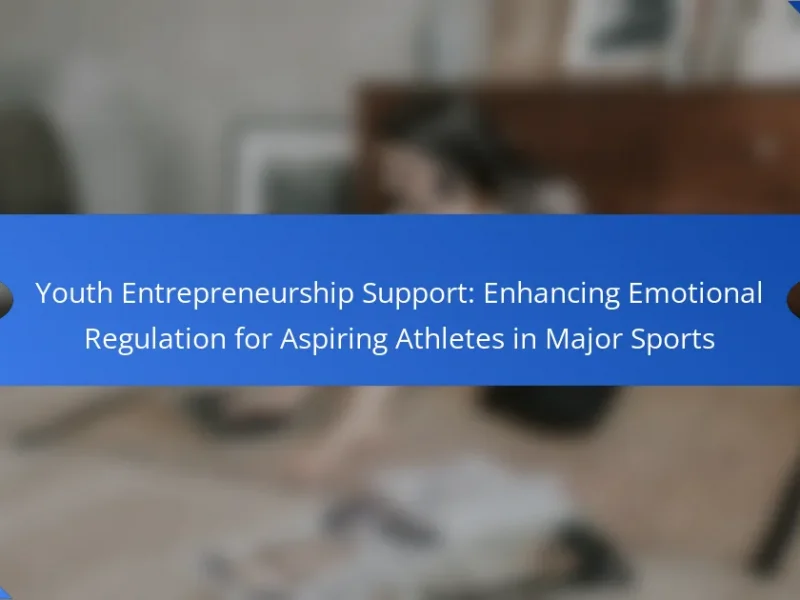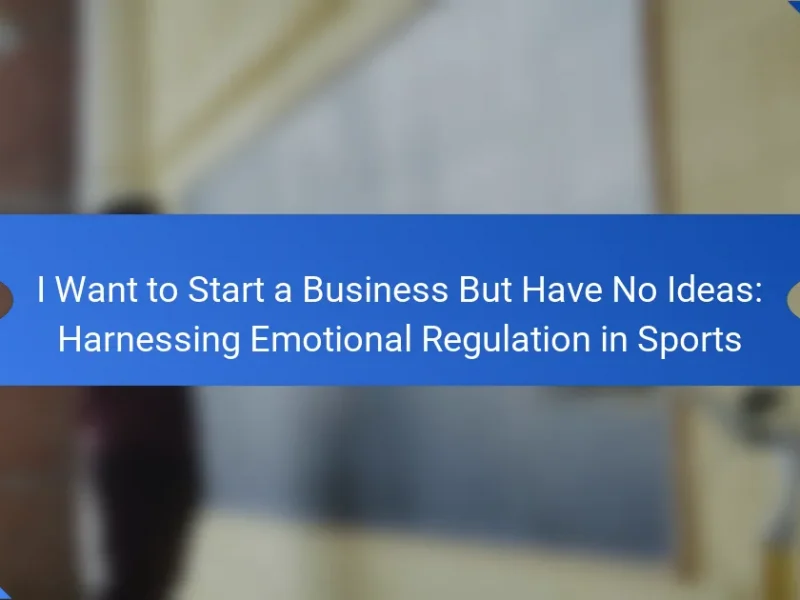Enhancing emotional regulation is crucial for coaches in major sports teams to improve performance and player well-being. This article explores mobile business ideas like mindfulness apps, virtual coaching platforms, and emotional regulation workshops. It also discusses performance tracking tools and community support networks to foster resilience. Implementing these strategies can lead to better communication and team dynamics.
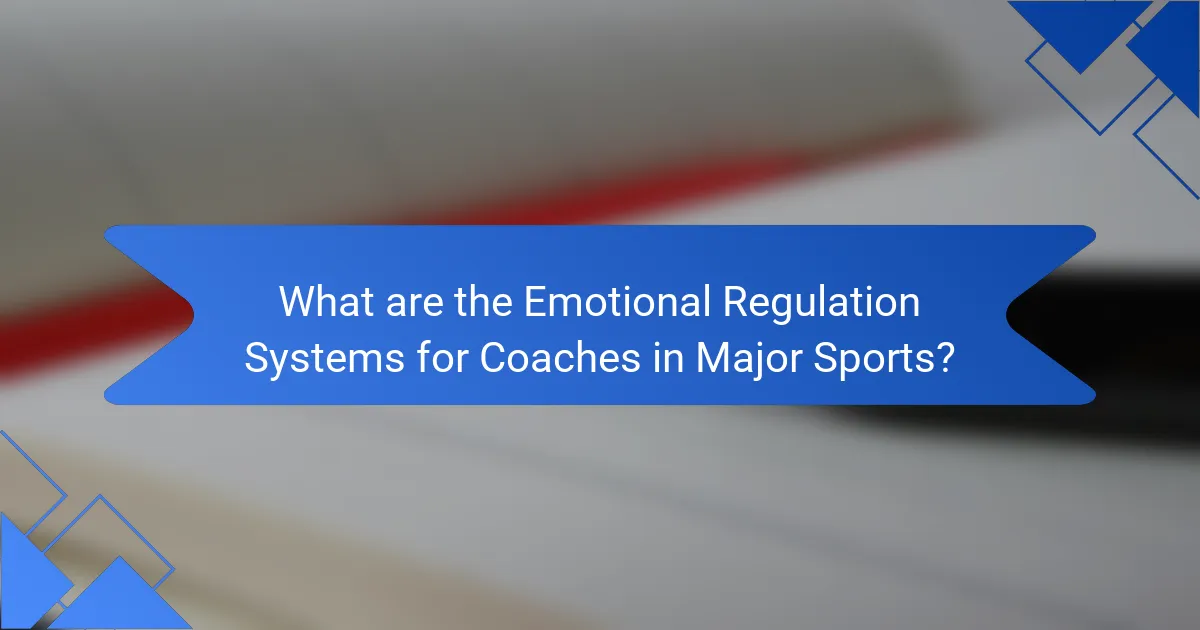
What are the Emotional Regulation Systems for Coaches in Major Sports?
Coaches in major sports utilise emotional regulation systems to enhance team performance and individual player well-being. These systems include techniques such as mindfulness training, cognitive restructuring, and emotional intelligence development. Mindfulness training helps coaches and players remain present and focused, reducing anxiety. Cognitive restructuring allows for reframing negative thoughts, promoting a positive mindset. Emotional intelligence development enhances interpersonal skills, fostering better communication and team cohesion. Implementing these systems can lead to improved performance metrics and overall team dynamics.
How do Emotional Regulation Systems impact athlete performance?
Emotional regulation systems significantly enhance athlete performance by improving focus and resilience. These systems help athletes manage stress and anxiety, leading to better decision-making during competitions. Coaches can implement mobile business ideas, such as apps for mindfulness training and emotional tracking, to support athletes. These tools provide real-time feedback on emotional states, allowing for timely interventions. As a result, athletes can maintain optimal performance levels, especially in high-pressure situations.
What are the core components of Emotional Regulation Systems?
Emotional Regulation Systems in sports teams consist of components that enhance performance and cohesion. Key components include awareness of emotions, cognitive appraisal, coping strategies, and social support systems. These elements work together to improve athletes’ emotional resilience and decision-making under pressure. Effective emotional regulation leads to better teamwork and overall success in competitive environments.
What techniques enhance emotional awareness in athletes?
Techniques that enhance emotional awareness in athletes include mindfulness practices, cognitive-behavioral strategies, and emotional intelligence training. These methods help athletes recognise and manage their emotions effectively, leading to improved performance. Mindfulness practices, such as meditation, promote present-moment awareness, reducing anxiety. Cognitive-behavioral strategies teach athletes to challenge negative thoughts, fostering resilience. Emotional intelligence training enhances interpersonal skills, allowing athletes to navigate team dynamics better. Implementing these techniques can result in a more cohesive and emotionally intelligent sports team.
How can coaches facilitate emotional expression?
Coaches can facilitate emotional expression by creating a safe environment, encouraging open dialogue, and utilising emotional regulation techniques. This approach enhances players’ ability to communicate feelings effectively, fostering team cohesion. Regular check-ins and workshops on emotional intelligence can further support this process, promoting mental well-being within major sports teams.
What role does feedback play in emotional regulation?
Feedback plays a crucial role in emotional regulation by enhancing self-awareness and facilitating adaptive responses. It allows athletes to understand their emotional states and adjust behaviours accordingly. Regular feedback helps coaches identify emotional patterns within teams, leading to improved performance and cohesion. Effective feedback mechanisms can foster a supportive environment, promoting resilience and mental toughness among athletes.

What mobile business ideas can support coaches in emotional regulation?
Mobile business ideas for coaches can significantly enhance emotional regulation in major sports teams. Digital platforms offering personalised mental training, mindfulness apps, and virtual coaching sessions are effective solutions.
1. Mobile Apps for Mindfulness: Provide guided meditation and breathing exercises tailored for athletes.
2. Virtual Coaching Platforms: Facilitate real-time emotional support and feedback during training sessions.
3. Emotional Regulation Workshops: Offer online courses focusing on coping strategies and resilience building.
4. Performance Tracking Tools: Monitor emotional states and provide analytics for coaches to tailor support.
5. Community Support Networks: Create forums for athletes to share experiences and coping techniques.
6. Gamified Emotional Training: Use game elements to engage athletes in emotional regulation practices.
These ideas leverage technology to support coaches and athletes in managing emotions effectively.
How can mobile apps assist in emotional monitoring?
Mobile apps can significantly enhance emotional monitoring for coaches in major sports teams by providing real-time data and analytics. These applications track athletes’ emotional states through mood assessments, stress levels, and engagement metrics. By utilising features like journaling and feedback loops, coaches can identify patterns and triggers affecting performance. This proactive approach fosters emotional regulation, leading to improved team dynamics and individual athlete resilience. Additionally, mobile apps facilitate communication between coaches and athletes, ensuring timely interventions and support.
What features should coaches look for in emotional regulation tools?
Coaches should prioritise user-friendliness, data analytics capabilities, and customisation options in emotional regulation tools. Effective tools should offer real-time feedback, integration with existing systems, and evidence-based strategies. These features enhance athlete engagement and support tailored emotional development.
Which data analytics can improve emotional insights?
Data analytics can enhance emotional insights by providing real-time feedback on player performance and emotional states. Techniques such as sentiment analysis and biometric data tracking can identify emotional triggers. For instance, wearable technology can monitor stress levels during games, allowing coaches to tailor interventions. Integrating these analytics fosters better emotional regulation, ultimately improving team dynamics and performance.
How can gamification enhance engagement in emotional training?
Gamification can significantly enhance engagement in emotional training by making the learning process interactive and enjoyable. By incorporating game-like elements, coaches can motivate athletes to actively participate in emotional regulation exercises.
For example, using points, badges, and leaderboards can create healthy competition among team members. This unique attribute of gamification fosters a sense of achievement and encourages continuous improvement in emotional skills.
As a result, athletes are more likely to embrace emotional training, leading to better performance and teamwork. Integrating gamification strategies into emotional training programs can transform traditional methods into dynamic and impactful experiences.

What are the unique benefits of mobile solutions for emotional regulation?
Mobile solutions for emotional regulation offer unique benefits such as real-time feedback, personalised coaching, and enhanced accessibility. These features empower athletes to manage stress and anxiety effectively. Real-time feedback allows immediate adjustment of techniques, fostering quicker emotional recovery. Personalised coaching tailors strategies to individual needs, improving engagement. Enhanced accessibility ensures that support is available anytime, facilitating consistent practice.
How do mobile platforms foster real-time feedback?
Mobile platforms enable real-time feedback by allowing instant communication and data sharing between coaches and athletes. This immediacy enhances emotional regulation through timely insights and adjustments. Features like push notifications and live analytics facilitate immediate responses to performance metrics, fostering a responsive coaching environment. As a result, athletes can address emotional states promptly, improving overall team dynamics and performance outcomes.
What advantages do mobile solutions offer over traditional methods?
Mobile solutions provide real-time communication, personalised feedback, and accessible data analysis, enhancing emotional regulation for coaches and athletes. These advantages streamline training, improve decision-making, and foster stronger team dynamics. Traditional methods often lack the immediacy and adaptability that mobile technology offers, making it essential for modern sports teams.
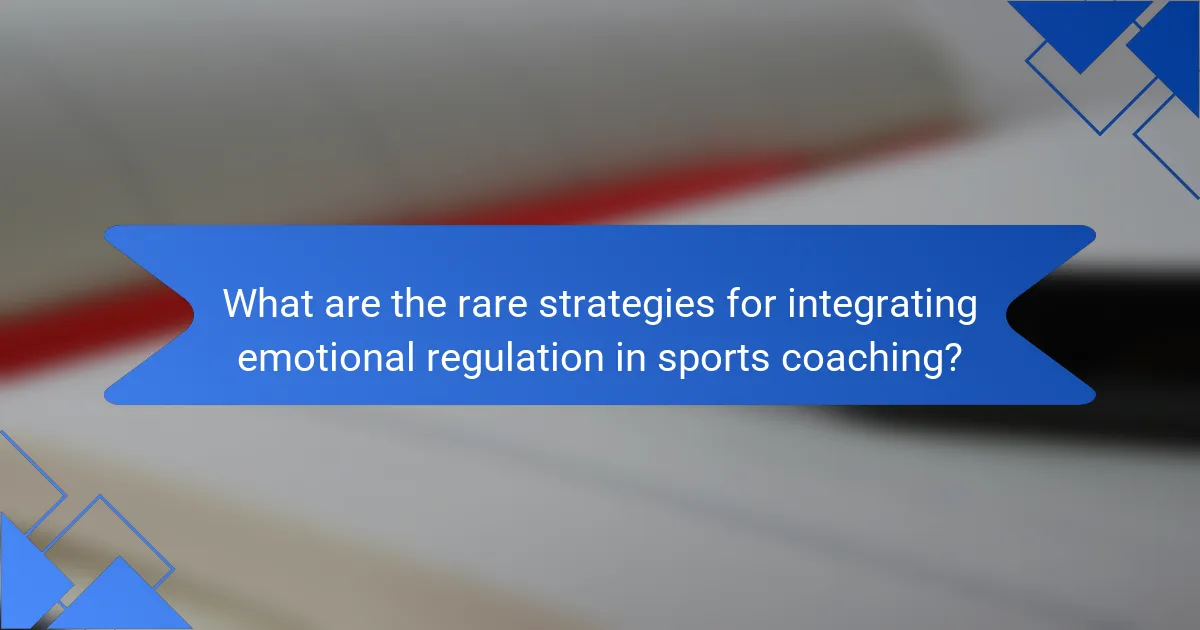
What are the rare strategies for integrating emotional regulation in sports coaching?
Integrating emotional regulation in sports coaching can be enhanced through unique strategies. One rare approach is the implementation of mindfulness training, which fosters self-awareness and emotional control among athletes. Another strategy involves using biofeedback technology to help coaches and players monitor physiological responses to stress, enabling real-time adjustments in emotional regulation techniques. Additionally, incorporating storytelling methods can create a deeper emotional connection and understanding of team dynamics, promoting resilience. Lastly, engaging in regular emotional check-ins during training sessions can cultivate a supportive environment, encouraging open dialogue about feelings and mental states.
Which innovative approaches have proven effective in elite sports teams?
Innovative approaches in elite sports teams focus on emotional regulation through technology and coaching strategies. Mobile applications for coaches enhance players’ emotional awareness and resilience. These tools provide real-time feedback and personalised training, fostering better mental health and performance. For instance, mood tracking features allow coaches to tailor support, leading to improved team dynamics and individual athlete growth.
How can cross-disciplinary methods enhance emotional regulation?
Cross-disciplinary methods can significantly enhance emotional regulation in major sports teams by integrating diverse perspectives and techniques. These methods combine psychology, neuroscience, and sports science to develop tailored strategies. For instance, incorporating mindfulness practices improves players’ focus and emotional awareness. Additionally, team-building exercises foster trust and communication, leading to better emotional support among athletes. As a result, teams experience improved performance and resilience under pressure.
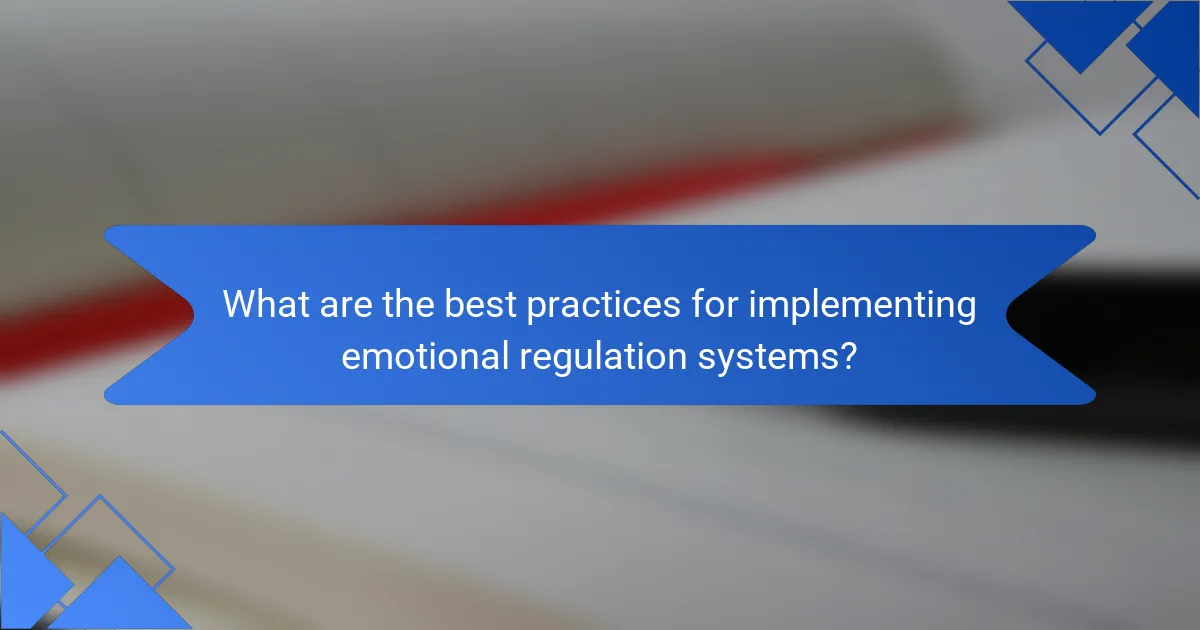
What are the best practices for implementing emotional regulation systems?
Implementing emotional regulation systems in sports teams involves structured training, consistent feedback, and team engagement. Coaches should prioritise creating a supportive environment that encourages open communication and emotional expression.
1. Establish clear objectives: Define what emotional regulation means for the team and set measurable goals.
2. Integrate training programs: Use workshops and sessions focused on emotional intelligence and coping strategies.
3. Utilise technology: Implement mobile applications that provide real-time feedback and emotional tracking for athletes.
4. Foster team bonding: Encourage activities that build trust and camaraderie among team members.
These practices enhance emotional resilience, leading to improved performance and teamwork.
What common mistakes should coaches avoid when using mobile tools?
Coaches should avoid over-reliance on mobile tools, neglecting personal interaction. They must ensure tools enhance emotional regulation without overwhelming players. Misusing data analytics can lead to incorrect assessments of player performance. Lastly, failing to provide adequate training on mobile tools can hinder their effectiveness.
How can coaches optimise emotional regulation strategies for their teams?
Coaches can optimise emotional regulation strategies by implementing structured training sessions that focus on mindfulness and resilience. Techniques such as breath control and visualisation enhance players’ emotional awareness, leading to improved performance under pressure. Regular feedback sessions foster a supportive environment, enabling athletes to express emotions constructively. Incorporating technology, like mobile apps for mental training, offers personalised strategies that adapt to individual needs. These approaches not only build emotional intelligence but also strengthen team cohesion, ultimately enhancing overall team dynamics.
What expert insights can enhance the effectiveness of emotional regulation systems?
Expert insights can significantly enhance emotional regulation systems for sports teams by integrating technology, training, and psychological strategies. Utilising mobile applications can provide real-time feedback on emotional states, allowing athletes to monitor their feelings during games. Regular workshops led by psychologists can teach coping mechanisms and mindfulness techniques, fostering resilience. Data analytics can identify patterns in emotional responses, enabling tailored interventions. Collaborating with experienced coaches who understand the nuances of emotional dynamics can further refine these systems. By combining these approaches, teams can improve performance and overall mental well-being.

